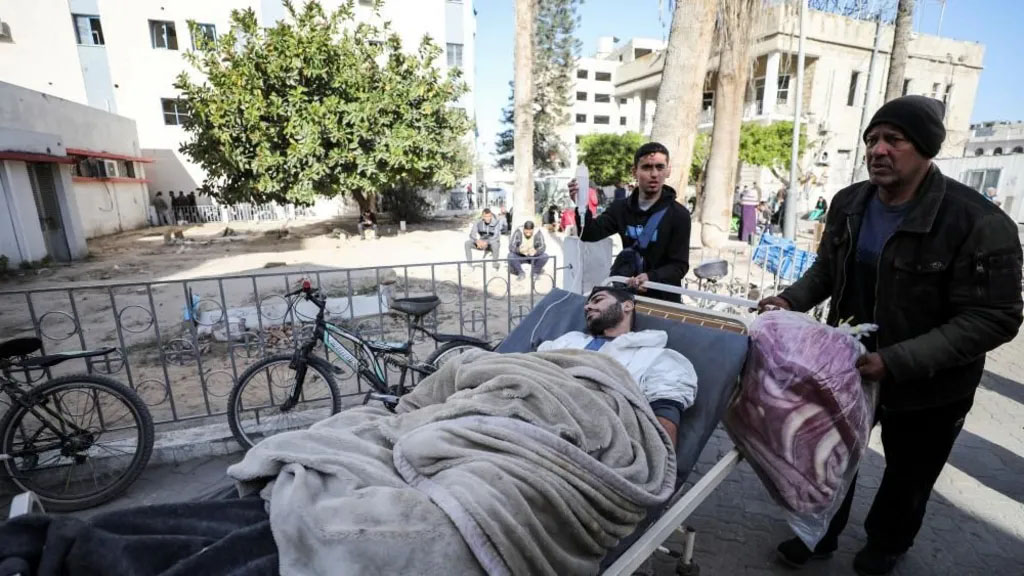International
Artemis 1: Nasa cancels moon mission launch over engine problem

Nasa is delaying a decision on the timing of its next launch attempt for Artemis 1, the US space agency’s first human-rated moon rocket in 50 years, after calling off Monday’s scheduled lift off late in the countdown because of an issue related to “engine bleed”
Engineers at Nasa’s launch complex in Cape Canaveral, Florida, discovered the problem with one of the four core-stage engines of the Space Launch System (SLS) rocket during overnight loading of 2.76m litres (730,000 gallons) of liquid hydrogen and oxygen fuel needed to send the spacecraft off on its 1.3m-mile, 42-day journey to the far side of the moon and back.
They were unable to find a fix in time to meet a two-hour launch window that opened at 8.33am (1.33pm BST) on Monday, and they are now troubleshooting the issue to assess readiness for the next available opportunity, on Friday 2 September.
“Friday is definitely in play. We just need a little bit of time to look at the data, but the team is setting up for a 96-hour recycle,” Mike Sarafin, Nasa’s Artemis mission manager, told a lunchtime press conference.
“We’re going to play all nine innings. We’re not giving up yet.”
Sarafin said no decision could be made until mission managers conducted a readiness review beginning on Tuesday afternoon, noting that he did not believe the problem was with the engine itself, but in the bleed system that “conditions” it with cryogenic propellant and adjusts the temperature for launch.
“The team… also saw an issue with a vent valve at the inner tank, so the combination of not being able to get the engine three chilled down and then the vent valve issue caused us to pause today, and we felt like we needed a little little more time,” he said.
READ ALSO:
- Lagos records 2 kidnap cases in 7 months — CP
- FG warns of fresh xenophobic attacks in South Africa
- Lifting 100m Nigerians out of poverty: FG kicks off project T-MAX in Lagos
Sarafin added that poor weather conditions at launchpad 39B at Kennedy Space Centre throughout Monday’s window would also have precluded the launch taking place.
The uncrewed Artemis flight is a crucial test mission designed to gauge the capabilities of the SLS rocket and six-person Orion crew capsule ahead of humanity’s planned return to the moon for the first time in half a century.
If Artemis 1 ultimately succeeds, astronauts will be onboard an interim test flight along the same route 40,000 miles beyond the moon and back, a trek scheduled for 2024. The first moon landing since Apollo 17 in December 1972 would follow a year or so later, with Nasa declaring it will carry the first woman to walk on the lunar surface.
Upwards of a quarter-million people flocked to Florida’s space coast on Monday to watch a moment in history now postponed to later this week, or even later in September or October, if engineers cannot quickly diagnose and address the cause of the engine bleed issue.
Problems with the rocket, which is made by Boeing, first arose during a “hot fire” test in January last year, when the engines shut down only one minute into a scheduled eight-minute run. The project at that stage was already almost three years behind schedule and $3bn (£2.55bn) over budget.
Critics say the ultimate cost to the US taxpayer of the Artemis programme, projected to reach $93bn (£79bn) by 2025, and which has longer-term goals of placing the first humans on Mars in 15 to 20 years’ time, cannot be justified.
But the Nasa administrator, Bill Nelson, a former space shuttle astronaut, said there was greater purpose in placing new human footprints in lunar soil now from those of the 12 men of the Apollo programme who did so over six missions in a past generation.
“We need to be on the moon for much longer periods of time than just landing like we used to, stayed a couple of days and left,” Nelson told NBC’s Meet the Press on Sunday. “This time we’re going back, we’re going to live there, we’re going to learn there. We’re going to develop new technologies, all of this so we can go to Mars with humans.
“All of this is to develop where we may be living on other worlds. They may be floating worlds, they may be the surface of Mars. But this is just part of our push outward, our quest to explore, to find out what’s out there in this universe.”
Nasa’s shuttle program, which was retired in 2011, limited crewed missions to lower Earth orbit, and subsequently private US space companies, including Elon Musk’s SpaceX and Jeff Bezos’s Blue Origin, have flown, or are planning flights, to the International Space Station orbiting about 250 miles above Earth.
Artemis is Nasa’s first deep-space exploration project for decades and, unlike the Apollo and shuttle programmes before it, relies heavily on outside contractors and international partners.
SLS is designed and manufactured by Boeing. The Orion crew capsule is the brainchild of Lockheed Martin. And the European Space Agency supplies the service module, the powerhouse of the spacecraft for its lunar journey once the powerful solid rocket boosters and core stage of SLS have placed it beyond Earth’s gravitational pull.
The ESM will push Orion farther from Earth than any human-rated space vehicle has ever flown before, providing electricity, water, oxygen and nitrogen and keeping the capsule on course and at the correct temperature before separating and burning up harmlessly in the atmosphere on its return to Earth.
International
Israel ejects Gaza hospital, detains medical personnel

Israel ejects Gaza hospital, detains medical personnel
The last major functioning hospital in northern Gaza was forcibly evacuated by the Israeli military on Friday after dozens of people were reportedly killed in Israeli strikes targeting the area.
Medical staff, including the director of the Kamal Adwan Hospital, have also been detained, Gaza health officials said on Saturday.
The hospital director, Dr Hussam Abu Safiya, was among the first to report that about 50 people had been killed in Israeli air strikes targeting the vicinity of the hospital on Friday.
The IDF had said it was carrying out an operation in the area, alleging the hospital was a “Hamas terrorist stronghold”.
On Friday, patients at the hospital were forcibly moved to the nearby Indonesian Hospital which doctors warn is damaged and unsuitable due to a lack of power generators and water.
Eid Sabbah, head of the nursing department at Kamal Adwan, told the BBC the military had ordered the evacuation around 07:00 on Friday, giving the hospital about 15 minutes to move patients and staff into the courtyard.
Israeli troops then entered the hospital and removed the remaining patients, he said.
READ ALSO:
- We’re not aware of VeryDarkMan’s missing N180m — Police
- Trump asks Supreme Court to suspend law for TikTok ban
- Romeo and Juliet actress Olivia Hussey dies at 73
The IDF said it had “facilitated the secure evacuation of civilians, patients and medical personnel” before beginning the operation.
Seriously ill patients were moved to the nearby Indonesian Hospital, itself evacuated earlier in the week, which medics have described as non-functional.
“You can’t call it a hospital, it’s more of a shelter. It’s not equipped for patients,” Gaza’s deputy minister of health, Dr Abu-Al Rish, told the BBC on Friday.
Dr Sabbah, from Kamal Adwan Hospital, said: “It’s dangerous because there are patients in the ICU department in a coma and in need of ventilation machines and moving them will put them in danger.”
He had said critically ill patients needed to be moved in specialised vehicles.
The World Health Organization said the raid “has put this last major health facility in north Gaza out of service”.
“Initial reports indicate that some key departments were severely burnt and destroyed during the raid,” it posted on X on Friday.
Nadav Shoshani, international spokesman for the Israel Defense Forces (IDF), said in a post on Friday evening on X that a “small fire broke out in an empty building inside the hospital that is under control”.
This was when IDF troops were not inside the hospital, he said, adding that “after preliminary examination, no connection was found between IDF activity to the fire”.
The director of Kamal Adwan hospital had said on Friday that approximately 50 people had been killed, including five medical staff, in a series of Israeli air strikes targeting the vicinity of the hospital.
READ ALSO:
- Niger’s president faces fire at home over attack on Nigeria
- Israel attacks: UN warns humanitarian disaster in Yemen may get worse
- Wike: My fallout with Secondus was his opposition to Fubara
The statement from Dr Hussam Abu Safiya said a building opposite the hospital was targeted by Israeli warplanes, leading to the death of a paediatrician and a lab technician, as well as their families.
He said a third staff member who worked as a maintenance technician was targeted and killed as he rushed to the scene of the first strike.
Two of the hospital’s paramedics were 500m (1,640ft) away from the hospital when they were targeted and killed by another strike, the statement continued, with their bodies remaining in the street with no-one able to reach them.
The Israeli military said on Friday morning that it was “unaware of strikes in the area of Kamal Adwan hospital” and was looking into the reports that staff had been killed.
Kamal Adwan hospital in Beit Lahia has been under a tightening Israeli blockade imposed on parts of northern Gaza since October, when the military said it had launched an offensive to stop Hamas from regrouping there.
The UN has said the area is under a “near-total siege” as the Israeli military heavily restricts access of aid deliveries to an area where an estimated 10,000 to 15,000 people remain.
In recent days, the hospital’s administrators have issued desperate pleas appealing to be protected, as they say the facility has become a regular target for Israeli shelling and explosives.
Oxfam said that attempts by aid agencies to deliver supplies to the area since October had been unsuccessful because of “deliberate delays and systematic obstructions” by the Israeli military.
Additional reporting by Shaimaa Khalil
Israel ejects Gaza hospital, detains medical personnel
BBC
International
Trump asks Supreme Court to suspend law for TikTok ban

Trump asks Supreme Court to suspend law for TikTok ban
US President-elect Donald Trump filed a brief Friday urging the Supreme Court to pause a law that would ban TikTok the day before his January 20 inauguration if it is not sold by its Chinese owner ByteDance.
“In light of the novelty and difficulty of this case, the court should consider staying the statutory deadline to grant more breathing space to address these issues,” Trump’s legal team wrote, to give him “the opportunity to pursue a political resolution.”
Trump was fiercely opposed to TikTok during his 2017-21 first term, and tried in vain to ban the video app on national security grounds.
The Republican voiced concerns — echoed by political rivals — that the Chinese government might tap into US TikTok users’ data or manipulate what they see on the platform.
US officials had also voiced alarm over the popularity of the video-sharing app with young people, alleging that its parent company is subservient to Beijing and that the app is used to spread propaganda, claims denied by the company and the Chinese government.
Trump called for a US company to buy TikTok, with the government sharing in the sale price, and his successor Joe Biden went one stage further — signing a law to ban the app for the same reasons.
– Reversing course –
Trump has now, however, reversed course.
At a press conference last week, Trump said he has “a warm spot” for TikTok and that his administration would take a look at the app and the potential ban.
READ ALSO:
- Romeo and Juliet actress Olivia Hussey dies at 73
- Niger’s president faces fire at home over attack on Nigeria
- Israel attacks: UN warns humanitarian disaster in Yemen may get worse
Earlier this month, the president-elect met with TikTok CEO Shou Zi Chew at his Mar-a-Lago residence in Florida.
Recently, Trump told Bloomberg he had changed his mind about the app: “Now (that) I’m thinking about it, I’m for TikTok, because you need competition.”
“If you don’t have TikTok, you have Facebook and Instagram — and that’s, you know, that’s Zuckerberg.”
International
Romeo and Juliet actress Olivia Hussey dies at 73

Romeo and Juliet actress Olivia Hussey dies at 73
Actress Olivia Hussey, who shot to international prominence as a teenager for her role in the acclaimed 1968 film version of Romeo and Juliet, has died aged 73.
The Argentinian-born actress, who grew up in London, died on Friday surrounded by her loved ones, a statement posted on her Instagram said.
Hussey won the best new actress Golden Globe for her part as Juliet, but decades later she sued Paramount Pictures for sexual abuse as she was aged just 15 when she filmed the movie’s nude scene.
Her other most notable screen role was as Mary, mother of Jesus, in 1977 TV miniseries Jesus of Nazareth.
“As we grieve this immense loss, we also celebrate Olivia’s enduring impact on our lives and the industry,” the statement said.
Hussey was born in Buenos Aires, Argentina, in 1951, before moving to London aged seven and studying at the Italia Conti Academy drama school.

1968’s Romeo and Juliet was nominated for best picture and director Oscars
She was 15 when Romeo and Juliet director Franco Zeffirelli discovered her onstage, playing opposite Vanessa Redgrave in the play The Prime of Miss Joan Brodie
READ ALSO:
- Niger’s president faces fire at home over attack on Nigeria
- Israel attacks: UN warns humanitarian disaster in Yemen may get worse
- Wike: My fallout with Secondus was his opposition to Fubara
Zeffirelli was looking for someone who was young enough to be a convincing Juliet in what he intended to be the definitive cinematic version of the Shakespeare play.
He cast Hussey alongisde British 16-year-old Leonard Whiting as Romeo in the film.
The film was nominated for an Oscar for best picture and director. Hussey missed out on an Oscar nomination herself in a strong year in which Barbra Streisand won the main award for Funny Girl.
But at that year’s Golden Globes Hussey won the award for best new star.
Decades later, she and Whiting sued Paramount Pictures alleging Zeffirelli – who died in 2019 – had encouraged them to film nude scenes despite previous assurances they would not have to.
The pair sought damages of more than $500m (£417m), based on suffering they said they had experienced and the revenue brought in by the film since its release.
But last year a judge dismissed the case, finding the scene was not “sufficiently sexually suggestive”.
In 1977, Hussey had reunited with Zeffirelli for Jesus of Nazareth to play the Virgin Mary, before appearing in Death on the Nile a year later based on Agatha Christie’s novel.
Her roles in early slasher film Black Christmas (1974) and TV film Psycho IV: The Beginning earned her recognition as a scream queen. In the latter, she p[layed Norman Bates’s mother in a prequel storyline.
In later years she also took on work as a voice actress, appearing frequently in video games.
But she did have one final reunion with her former Romeo – as she and Whiting appeared together in the 2015 British film Social Suicide, which was loosely based on Romeo and Juliet, albeit set in the social media era.
Romeo and Juliet actress Olivia Hussey dies at 73
BBC
-

 Business2 days ago
Business2 days agoBe creative, monarch, others challenge Muslim professionals on economic revival
-

 Auto2 days ago
Auto2 days agoLSM MD extols founder’s qualities after latter posthumous industry award
-

 Entertainment2 days ago
Entertainment2 days agoMultiChoice announces free access to all DSTV channels for 3 days
-

 metro2 days ago
metro2 days agoJigawa State governor loses son 24 hours after mother’s death
-

 News1 day ago
News1 day agoNigeria Customs Service begins 2025 recruitment [How to apply]
-

 metro1 day ago
metro1 day agoHeavy security in Ilesa as ex-Osun deputy gov emerges new Owa-Obokun
-

 metro1 day ago
metro1 day agoLagos Imam to Tinubu: You haven’t disappointed us
-

 metro1 day ago
metro1 day agoDangote, Tinubu, Lookman named among 100 most influential Africans in 2024 (Full list)













